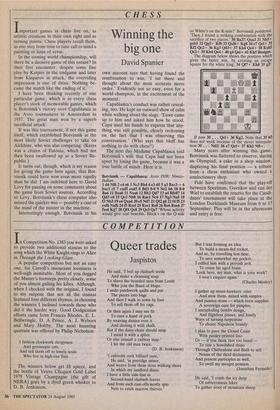CHESS
Winning the big one
David Spanier
Important games in chess live on, as artistic creations in their own right and as turning points. Chess players recall them, as one may from time to time call to mind a painting or lines of verse.
In the coming world championship, will there be a decisive game of this nature? In their first encounter, despite some fine play by Karpov in the endgame and later from Kasparov in attack, the overriding impression is one of dross. Nothing be- came the match like the ending of it.
I have been thinking recently of one particular game, which is in every chess player's stock of memorable games, which is Botvinnik's victory over Capablanca in the Avro tournament in Amsterdam in 1937. The great man won by a superb sacrificial attack.
It was this tournament, if not this game itself, which established Botvinnik as the most likely Soviet challenger to take on Alekhine, who was also competing. (Keres was a citizen of Estonia, which had not then been swallowed up as a Soviet Re- public.) It turns out, though, which is my reason for giving the game here again, that Bot- vinnik could have won even more rapidly than he did. I am indebted here to David Levy for passing on some comments about the game from Soviet sources. According to Levy, Botvinnik's chess computer also missed the quicker win — possibly a case of the mind of the master in the machine.
Interestingly enough, Botvinnik in his own account says that having found the combination to win, 'I sat there and thought about the most accurate move order.' Evidently not so easy, even for a world champion, in the excitement of the moment.
Capablanca's conduct was rather reveal- ing, too. He kept an outward show of calm while walking about the stage. 'Euwe came up to him and asked him how he stood. Capa used his hands to express that any- thing was still possible, clearly reckoning on the fact that I was observing this conversation.' (Who says that bluff has nothing to do with chess?) The next day Madame Capablanca told Botvinnik's wife that Capa had not been upset by losing the game, because it was a true battle of minds. Here it is.
Botvinnik — Capablanca: Avro 1938; Nimzo- Indian.
1 d4 Nf6 2 c4 e6 3 Nc3 Bb4 4 e3 d5 5 a3 Bxc3 + 6 bxc3 c5 7 cxd5 exd5 8 Bd3 0-0 9 Ne2 b6 10 0-0 Ba6 11 Bxa6 11 Nxa6 12 Bb2 Qd7 13 a4 Rfe8? 14 Qd3 c4 15 Qc2 Nb8 16 Rae! Nc6 17 Ng3 Na5 18 f3 Nb3 19 e4 Qxa4 20 e5 Nd7 21 Qf2 g6 22 f4 f5 23 exf6 Nxf6 24 f5 Rxel 25 Rxel Re8 26 Re6 Rxe6 27 fxe6 Kg7 28 Q14 Qe8 29 Qe5 Qe7 'Whose activity would give real benefits, Black's on the 0-side
or White's on the K-side?' Botvinnik pondered. 'Then I found a striking combination with the sacrifice of two pieces.' 30 Ba3!! Qxa3 31 Nh5+ gxh5 32 Qg5+ K18 33 Qxf6+ Kg8 34 e7 Qcl+ 35 Kfl Qc2+ 36 Kg3 Qd3+ 37 Kh4 Qe4+ 38 Kx1i5 Qe2+ 39 Kh4 Qe4+ 40 g4 Qel+ 41 Kh5 Resigns.
The diagram below shows the position which gives the faster win, by creating an escape square for the white king. 34 Qf7+ Kh8 35 g3!
If now 35. . . Qcl+ 36 Kg2. Note that 35 6.3 does not work because of the clever interpola- tion 35 . . . Nd2! 36 e7 Qcl+ 37 Kh2 Nfl+.
Many years after winning this game, Botvinnik was flattered to observe, during an Olympiad, a cake in a shop window, displaying his final position — a tribute from a chess enthusiast who owned a confectionery shop.
Fide have confirmed that the play-off between Speelman, Gavrikov and van der Wiel to establish the reserve for the Candi- dates' tournament will take place at the London Docklands Museum from 6 to 17 September. Play will be in the afternoons and entry is free.










































 Previous page
Previous page